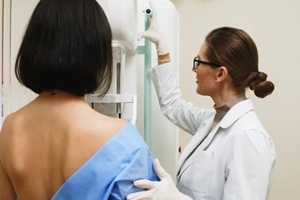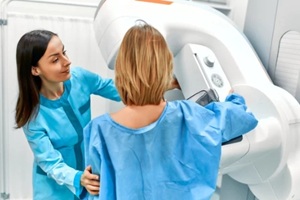 Mammograms remain an essential part of women’s healthcare throughout their lives. Some may hear their doctors encourage them to go in for a breast cancer screening as early as their 20s if they are predisposed to cancer development.
Mammograms remain an essential part of women’s healthcare throughout their lives. Some may hear their doctors encourage them to go in for a breast cancer screening as early as their 20s if they are predisposed to cancer development.
Still, most women will start screening around age 40. However, some women may find the concept of mammography intimidating, largely because they do not realize that some of the information they have about the process is, in fact, false!
Many common myths about mammograms are so widely circulated that telling the difference between fact and fiction becomes difficult.
Here are some common misconceptions about mammograms and how to debunk them using evidence-based science and data.
Myth: Getting a Mammogram Hurts
Every woman’s body is different, as is her pain tolerance compared to other people. Research into the potential discomfort associated with a mammogram demonstrates that, in general, less than 5% of women describe their experience as severely painful.
This study also discovered that when women were going into their first mammogram, they were even less likely to describe the process as painful. Researchers determined this was because they were not building up anticipation of how uncomfortable the procedure might be.
If you are getting ready for a mammogram, approach it with an open mind. This prevents your body from anticipating pain where none might exist and keeps the process more relaxed. A compassionate, helpful team can guide you through the procedure with your comfort in mind.
Myth: Mammograms Are Only for People With Family History
A person’s genetic history plays a role in the development of certain types of cancer, and breast cancer is one such variant. However, all women should be screened for breast cancer regularly, regardless of their family history.
Research has found that between 5% and 10% of patients who are newly diagnosed with breast cancer do have a familial component, such as other family members with breast or ovarian cancer.
This leaves a large portion of women who are diagnosed despite having no previous incidences of breast cancer in the family. Taking charge of your own health is a decision, regardless of what medical events have happened in your family’s past.
Myth: Dense Breast Tissue Prevents Mammography
Dense breast tissue can be harder to see during a mammogram, but it does not stop mammography from being useful! Skilled practitioners who have experience working with patients with dense breasts are still capable of spotting abnormalities in this type of tissue.
Additionally, studies remain ongoing into other methods that can supplement mammograms, such as ultrasounds or MRIs with contrast. These have been shown to increase the identification rate of cancer, including in women with dense breasts. If you have dense breast tissue, do not let that stop you from getting screened!
Myth: Self-Exams Are Enough
Many women perform regular breast self-exams at home, and that is a great thing. However, self-exams alone do not offer the highest detection rate for breast cancer. Research has gathered enough data to show that around 25% of women detect breast cancer on their own during self-examination.
Despite this, almost 50% of breast cancers are found during a mammogram. By combining these methods, women can see a significant increase in early detection rates. If you are doing self-exams, you are already making great progress. Do not forget to continue to care for yourself by getting screened.
Myth: Mammograms Increase Breast Cancer Rates
Some women have heard that mammograms actually increase breast cancer rates. However, this idea comes from confusion about the differences in correlation and causation. Women who have mammograms are indeed more likely to be diagnosed with breast cancer, because it was the mammogram that discovered it!
Similarly, suppose a woman never has a mammogram. In that case, she might not receive that breast cancer diagnosis, even if she does have breast cancer. Mammograms do not cause cancer, and this idea should not stop you from getting one.
Instead, it is important to know that about 66% of breast cancer diagnoses happen when the cancer is still localized (in a small area of the breast), thanks to women going in for their regular screenings. When cancer is at this small stage, the five-year survival rate is as high as 99%.
Embrace Your Long-Term Health by Scheduling a Mammogram
 Mammograms are an important part of lifelong healthcare for women. However, at Raleigh Gynecology & Wellness, we understand that the mammography process can seem intimidating or confusing.
Mammograms are an important part of lifelong healthcare for women. However, at Raleigh Gynecology & Wellness, we understand that the mammography process can seem intimidating or confusing.
Our all-women team is happy to help you digest the mammography procedure so you always know what to expect. We approach each patient’s care with compassion and a goal of long-term wellness. Contact Raleigh Gynecology & Wellness today to schedule your mammogram!
